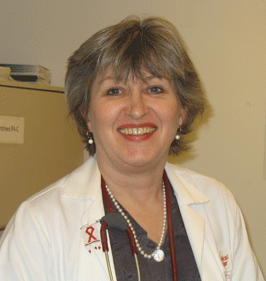 |
Dr. Susan Swindells |
This proposal immediately received both strong endorsements from AIDS advocates across the nation as a great potential benefit in public health and deep concern from others because of the stigma of AIDS and the fear of social ostracism still experienced by too many people living with the disease.
Although researchers estimate that more than 1 million Americans are infected with HIV, at least 250,000 of them do not know they are infected. The mass testing suggested by the CDC could literally diagnose tens of thousands of new cases. It could have a profound effect on the rising infection rate because the majority of new cases are transmitted by people who simply do not know that they are infected by the virus.
Susan Swindells, M.B.B.S., medical director of the HIV clinic at UNMC and the Terry K. Watanabe Professor of Internal Medicine in the section of infectious diseases, has been treating HIV/AIDS patients for almost 25 years. She is now recognized as one of the world’s leading authorities and researchers on the disease.
Dr. Swindells is cautiously optimistic about this latest recommendation by the CDC. She wonders who will pay for the medications and other needs of the thousands of new cases that could be diagnosed. Dr. Swindells was part of the contingency led by AIDS patients, families of AIDS patients and health professionals who met with Nebraska state legislators in May to renew funding for the AIDS Drugs Assistance Program (ADAP) and she knows that treatment money can never be taken for granted.
In fact, the financial impact of mass testing can be envisioned by just the relatively small AIDS population in Nebraska who receive ADAP support. ADAP is intended to help HIV positive people stay healthy by assisting with the purchase of HIV prescription medications. ADAP provides HIV drug treatments for people who do not have private health insurance, do not qualify for Medicaid or are awaiting Medicaid eligibility and cannot afford to purchase the drugs themselves.
ADAP money is indispensable if UNMC’s AIDS clinic is to provide care for every patient who enters and it has to be renewed on an annual basis.
“Quite honestly, it could be a real challenge to absorb the costs of a large increase in new cases,” Dr. Swindells said. “We received renewed funding at the very end of the legislative session last spring. We really want to thank Sen. Jim Jensen and Sen. Ernie Chambers in particular, because they led the effort to renew our ADAP funds. They are two legislators who really understand AIDS and its issues.”
The UNMC clinic averages about 10 to 12 new patients a month and about 140 new patients each year, Dr. Swindells said.
“If we maintain this kind of trickle and keep up with our resources needs – money and professional staffing – we should be okay,” she said. “The real key in this equation is professional staffing. More clinical space or money for tests is important, but not as important as having the staff available for a new influx of patients.
“My experience, and that of my colleagues, is that once people know they are infected, they will do with the right thing, in terms of therapeutic compliance and social behavior. We believe that only a minority of HIV patients continue to behave irresponsibly,” Dr. Swindells said.
But, newly diagnosed patients require a lot of clinical staff time. The kind of work done in an AIDS clinic involves not just the technical aspects of testing and medical analysis, but also a lot of social issues. Many of the patients lack insurance or money for treatment. They may have issues with substance abuse or mental health problems that were present before infection or were induced by the stress of a diagnosis. All of this influences how much time and staff attention any individual patient may require each visit.
“It’s rare that we can say, ‘I’ll see you again in three months,'” Dr. Swindells said. “We spend a lot of time in adherence counseling and risk reduction and prevention. Even though family and friends can tell a patient that they need to get their act together, it simply doesn’t carry the same weight as when that patient hears it directly from me or one of the other doctors.”
Yet, after a quarter-century of clinical experiences and laboratory research, Dr. Swindells is more optimistic than ever about the future for all AIDS patients. An important part of this optimism will be shared during the 2006 Update for HIV Care Providers and Educators, a full-day workshop to be held Wednesday at the Scott Conference Center. The annual update offers a series of presentations on the latest research, clinical treatments and community education on HIV and AIDS.
This year’s presentations include “Current Hot Topics in HIV Medicine”; “Oral Manifestations of Methamphetamine Use”; “Cultural Influences on HIV/AIDS Prevention and Treatment for Sudanese People”; “Viral Hepatitis Co-Infection”; “What Current Research Tells Us About Effective HIV Prevention”; “Optimal Use of Antibiotic Agents in the HIV-Positive Population”; and “Managing Patients With Personality Disorders.”
“This is the fifth year for our conference – we have a real winning formula,” Dr. Swindells said. “People like it, attendance has increased every year and we draw from all over the region because the presentations are as good as anything you can get in New York City or San Francisco.”